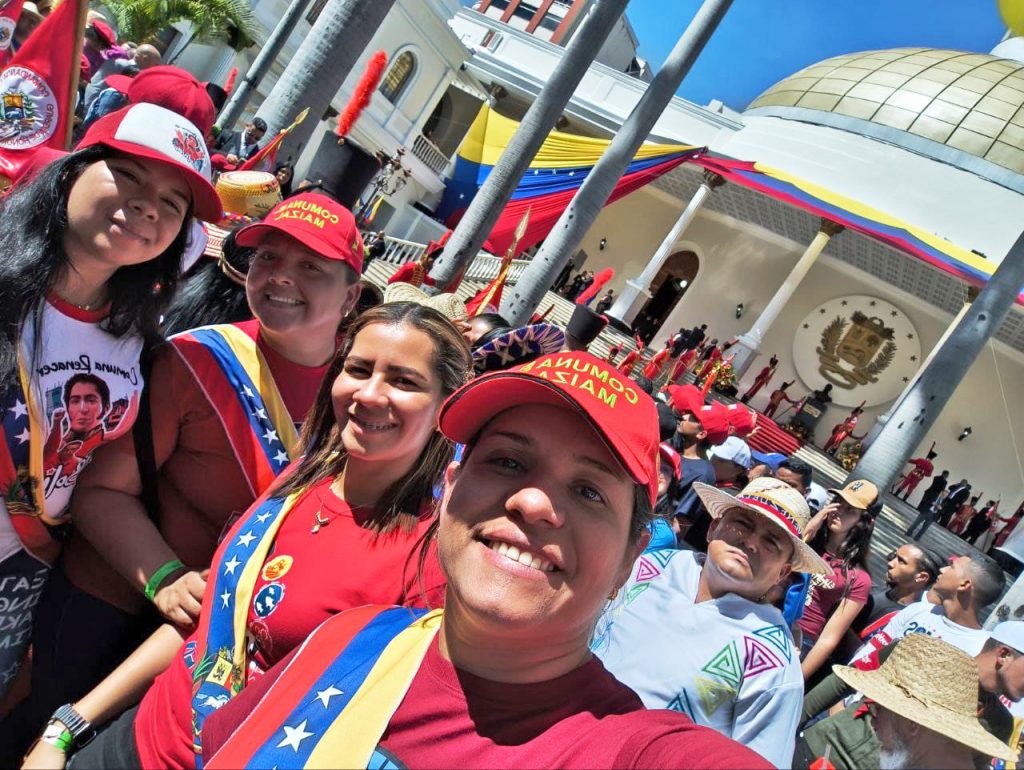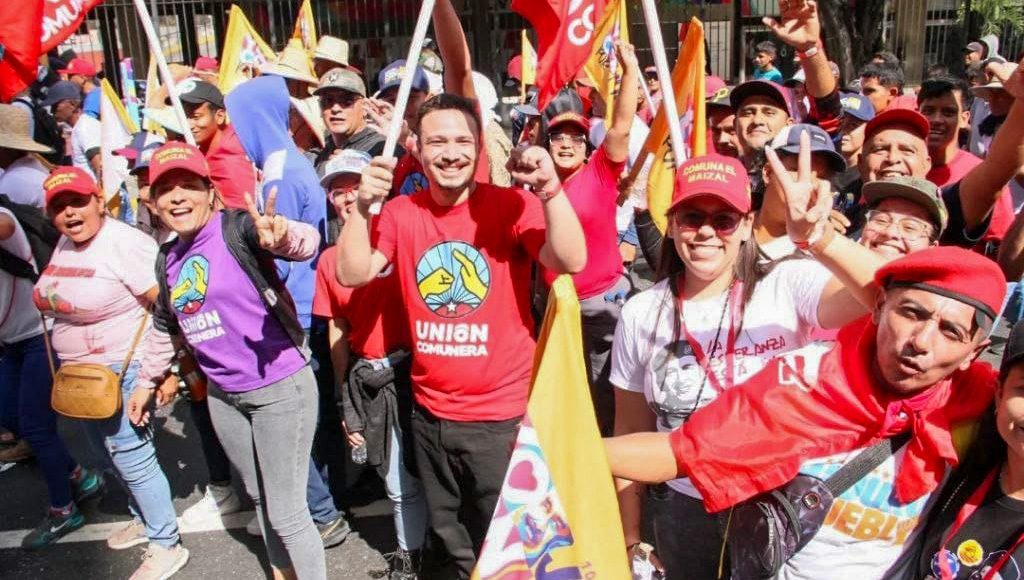At the beginning of January, representatives from the Revolutionary Communist Group joined the hundreds of thousands of revolutionaries who filled the streets of Venezuela in support of the return of President Nicolas Maduro for a third term. SAM MCGILL reports.
News of January’s mass mobilisations was suppressed by the capitalist media which peddles the lie that Maduro, a former union organiser, ‘stole’ last year’s presidential election and commands no support. In Caracas, 90-year-old Angel Manzano told us: ‘I voted for Maduro because he is a son of the people’. Youth organiser Miralys Mendoza added: ‘We voted for Maduro because this is our Bolivarian revolution, he is the constitutional president, this is a class war, and we are going to fill the streets as many times as is necessary.’
For 25 years Venezuela’s Bolivarian revolution has been engaged in a struggle against imperialism, catalysed by the election of President Hugo Chavez, former leader of the United Socialist Party of Veneuzuela (PSUV) until his death in 2013. This process is continued today by Maduro. Its commitment to building socialism, creating space for direct, participatory democracy and social production through the communal movement is anathema to British imperialist interests. Ruling class mouthpieces like The Guardian and the BBC are determined to ensure that Venezuela’s revolution ‘will not be televised’. It is up to anti-imperialists to break through this media blockade and tell the truth about what is really going on in Venezuela.
Guaido 2.0: another elaborate flop
On 28 July, Nicolas Maduro won 6.4 million votes (52%) while US-backed opposition candidate Edmundo Gonzalez won 5.3 million (43%). For months the international capitalist media wove a narrative of mass support for Gonzalez, where anything but a defeat for Maduro would be considered fraud. Spearheading this was far-right leader Maria Corina Machado, head of USAID-funded NGO Sumate, who over the last two decades has orchestrated a string of violent destabilisation strategies (see FRFI 299). On election night, after transmitting 80% of the results, Venezuela’s electoral council was knocked offline by a massive cyber-attack. The opposition then released its own ‘results’ on a suspect website, claiming Gonzalez won a landslide. Machado’s fascist commanditos fomented violence on the streets leaving 27 people dead; two women grass-roots leaders were assassinated. The masses responded with huge daily rallies demanding the popular vote be respected, while opposition protests quickly petered out. Though the Supreme Court confirmed Maduro’s victory, the narrative of a fraudulent election was cemented: Argentina, Israel and eight other countries declared Gonzalez ‘president-elect’ shortly after the election, followed by the EU Parliament in September and the United States in November.
Though it stopped short of officially recognising Gonzalez as president, Britain’s Labour government refuses to acknowledge Maduro’s election victory. Labour’s Foreign Secretary and defender of Israeli genocide, David Lammy, opined ‘We will not stand by as Maduro continues to oppress, undermine democracy and commit human rights violations’. On the pretext of ‘disputed’ ownership, Britain continues to embargo 31 tons of Venezuelan gold in the Bank of England worth approximately £2bn. The British opportunist left has largely abandoned solidarity with Venezuela. Their failure to support Maduro amounts to supporting the pro-imperialist opposition.
Gonzalez ducked a string of court appearances leading to an arrest warrant on 2 September. However, following negotiations with the Venezuelan state he was facilitated to seek residence in Spain five days later. Threatening to re-create the debacle of 2019 when opposition deputy Juan Guaido swore himself in as ‘interim President’ and launched a US-backed coup attempt, Gonzalez embarked on a tour of the Americas, promising to enter Venezuela ‘by any means necessary’ and appealing to the Bolivarian armed forces to support him. On 9 January, the day before the inauguration, Machado addressed an opposition protest in Caracas, her first public sighting since August. She failed to attract more than around 7,000. Widely circulated reports that she had been ‘kidnapped’ by state forces were exposed as fake news only hours later. Facing an arrest warrant for forgery of public documents, conspiracy and sabotage, Gonzalez headed meekly back to the US for a back-row seat at president-elect Trump’s inauguration.
The streets belong to the revolutionaries


Scoffing at The Guardian headline ‘Venezuela tumbles deeper into dictatorship’, Juan Carlos Roman, who joined crowds gathered at Miraflores presidential palace, told us ‘Today, we proudly say that Venezuela does not have a dictatorship… Here there is democracy, the streets prove it, the streets speak for themselves’. More than 120 countries have recognised Maduro and the ceremony inside the National Assembly in Caracas was attended by delegates from 125 countries. Maduro then addressed crowds on the streets who pledged alongside him, swearing to:
‘Continue the process of construction of a powerful Venezuela, of a new economic model that will give us prosperity, of a social model of socialism and equality. …to consolidate People’s Power… to fight to defeat fascism and imperialist conspiracies, and … to defend the right of my homeland to peace and the future’.
Mass support for the Bolivarian Revolution
In 2024 the Great Housing Mission of Venezuela built its five-millionth unit of social housing. We visited the El Gigante de Patria estate in Belles Artes. Housing mission resident Silvestre Montilla explained ‘after intense rains destroyed the houses of thousands of people who had historically been excluded, condemned to live on the margins, on the precarious hillsides, Chavez decreed that this land must be made public and launched a massive campaign to construct decent social housing. Thanks to these policies, people today live in the city centre and have the right to all of the projects of the revolution.’
Nearby a cable car connects the hills of San Agustin, a predominantly Afro-Venezuelan community, to the Caracas metro network, an early project of Hugo Chavez designed to promote inclusion. Such achievements are deeply connected with the project of participatory democracy with communal councils involved in the planning, construction and upkeep of the metro cable.
Working-class democracy
Communal councils organise in neighbourhoods to identify and address the needs of their communities. These link to form communes, which organise on a larger scale. Envisaged as building blocks for a future socialist society, there are over 4,100 communes in Venezuela today. From the highs of public spending and oil boom of 2012 to the oil crash, asphyxiating sanctions and hyperinflation that followed, the communal movement evolved from an experiment in participatory democracy and distribution to a method of production and survival. As Ana Maldonado of the Francisco Miranda Front emphasised, ‘people are making a new revolution on the ground, trying out new ways to face the hybrid war. During the Covid-19 crisis, people didn’t wait for any intervention from the state to make masks, they organised people who could sew in their communities, they isolated vulnerable people, essentially organising community hospitals, constructing the communal state amidst the crisis.’
We visited the emblematic El Panal 2021 commune in 23 de Enero, Caracas where communal activist Jorge Quereguan explained ‘participatory and protagonist democracy transcends representative democracy where people vote and delegate their right to make decisions to another person. We elect a communal council, but in order for that communal council to make key decisions, it has to call an Assembly and we all have to agree with that decision’. This approach has been central to El Panal’s economic district where social ownership and an anti-capitalist economic mode of production prevails. The Abejitas (Little Bees) textile workshop produces clothing. In 2023 it produced 5,200 free uniforms for local schools. The fabric was provided by the state which then paid the workshop for its products. So far, the surplus from the textile workshop has supported the opening of a communal laundry which in turn provides investments for a chemical workshop, producing household cleaning materials, promoting import substitution.
Fighting sanctions with socialism
Though still facing sanctions, Venezuela’s economy has significantly improved, achieving 9% GDP growth last year with non-oil exports reaching $3bn in 2023. The PSUV has channelled new funds into building communal power, facilitating a series of popular consultations whereby communes propose and vote on priority community projects, receiving direct state financing to implement them. By December 2024 three consultations had taken place with a further three scheduled in 2025. Around $10,000 is made available to each of the 4,530 communal circuits at each consultation. 70% of the public sector budget is to be disbursed in this way while new experiments in electing ‘communal justices’ and a constitutional reform are also underway. We saw the tangible impact of this process, as El Panal organisers showed us a new ambulance selected through popular consultation. At Jose Felix Ribas commune, Guarenas, we visited a polyclinic and orthodontic centre, where communal activists and health-workers showed us new medical equipment and repaired buildings.
Alongside national agribusiness, communal organisation has been central to the struggle for food sovereignty. Ensuring basic nutrition needs are met, the CLAP (Committees of local supply and production) project distributed 132 million food boxes in 2024, with 95% of items produced in Venezuela, an outstanding feat for a country that only a decade ago imported the majority of its food. Ursula Spianza from Hecho en Comuna (Made in the commune) showed us maize, cacao, honey, coffee, black beans and chocolate produced for market sale by communes.
We visited La Rinconada where a huge camp of communal activists from rural campesino and fishing communities had gathered to support the inauguration and exchange ideas. Over 10,000 attended over five days. Emily Castro from the Movement of Small Farmers explained: ‘We support small peasant producers (campesinos) occupying idle land by giving them seeds from our seed banks. We coordinate the prices in advance and coordinate with the Ministry of Food to secure distribution zones with urban communes, bringing them food at economical prices, bypassing speculation.’
The construction of this communal state inside the existing capitalist state inherited by the Bolivarian Revolution is not without contradictions. Heading the Ministry of Communes and Social Movements, Angel Prado, renowned communal leader from the rural El Maizal commune told us ‘In this new offensive, the fight for the communal state has been reinvigorated, and any external or internal force that refuses to give way to the communal struggle will be neutralised. We are fighting the bourgeois state from within. We build our communal model as the only way to build Bolivarian socialism…we, the people, voted for Nicolas Maduro. He is firmly determined to carry out Comandante Chavez’s order to build the communes. A revolution makes no sense, if it doesn’t hand over power to the people’.
In the crosshairs of imperialist intervention
The US has heinously increased its bounty on Maduro’s head to $25m while Britain announced a fresh round of sanctions on Venezuelan officials in a coordinated action with the European Union. Venezuela now faces over 1,000 ‘unilateral coercive measures’ designed to cut off lines of credit, freeze assets and block trade. An estimated 100,000 Venezuelans have died since 2015 as a result of lack of medical treatment due to this blockade. We in imperialist Britain have a duty to combat the media war against the Bolivarian Revolution and organise against imperialist aggression.
Viva Venezuela – No Sanctions!
No Coup!
FRFI meets Leila Khaled in Caracas

Venezuela has hosted thousands of anti-imperialists from around the globe, including delegations from the Alliance of Sahel States in West Africa and the Palestinian freedom fighter Leila Khaled, who upon visiting the El Panal 2021 commune exclaimed ‘In the name of the Popular Front for the Liberation of Palestine, I congratulate you on this project and the tremendous work you are doing; this is the future for generations to come. This is the foundation upon which the socialist project stands…. the communes are the path to freedom and dignity.’
FIGHT RACISM! FIGHT IMPERIALISM! 304 February/March 2025




